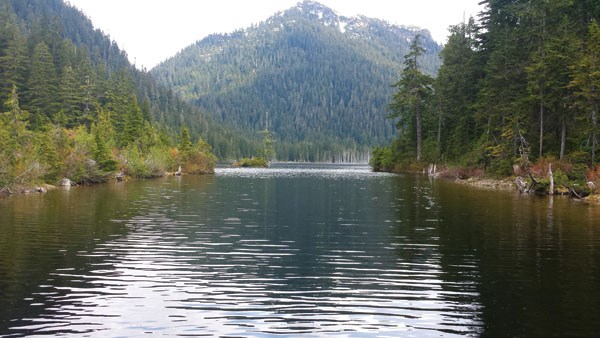Former Gibsons mayor Barry Janyk has levelled heavy criticism against the province after an April 19 meeting between the Tetrahedron Advisory Committee (TAC), of which he is a founding member, and BC Parks to discuss the Chapman Lake Expansion Project.
Janyk said the proposal by Ministry of Environment and Climate Change Strategy to conduct an open-house-style public meeting in Sechelt to discuss two options for amending Tetrahedron Provincial Park does not satisfy the conditions set out in the Tetrahedron Master Plan, which provides non-legally binding guidelines for park management, and which Janyk helped formulate.
In a letter addressed to the SCRD, Ministry of Environment regional director Jennie Aikman outlined two options for changing Tetrahedron Park to allow an infrastructure build for an expected eight-metre drawdown of Chapman Lake to alleviate water shortages on the Sunshine Coast. The first option is to cancel the Park’s Class A status, and the second would be to remove the 130 hectares containing Chapman and Edwards lakes from the park. In both cases, the areas would be designated as part of the Environmental Land Use Act.
Aikman’s letter states that a public consultation process will be launched by May, with the intention of bringing forward a recommendation to Environment Minister George Heyman for his consideration this summer. “We are preparing to hold a public open house in the Sechelt community which will launch a 30-day period during which the public will be able to provide their comments on the options presented,” she said in the letter.
But Janyk, citing the Tetrahedron Master Plan, said that’s not good enough. According to that plan, “an impact assessment and comprehensive public consultation process will be developed” if regional water supply changes are proposed within the park’s boundaries.
“Where Ms. Aikman and myself diverge is her interpretation of ‘comprehensive public consultation,’” Janyk said.
He thinks a town-hall public meeting with BC Parks and SCRD staff is a better option. “Dialogue as a group dynamic, that’s the important piece that’s missing here. And that’s why it’s important to have a ‘comprehensive’ discussion,” he said. “Because of the magnitude of what is being considered, that should predicate the type of engagement that is undertaken by BC Parks.”
When there are proposed developments that involve activities prohibited within a protected area – as is the case with the Chapman Expansion Project – the environment minister can recommend to cabinet and legislature that the park’s boundaries be adjusted. The minister may also decide not to recommend the boundary adjustment to cabinet, which can also reject it. The final decision is made by the legislature.
“This is a big deal, so having a little rinky-dinky open house is really not on. It’s not the right process,” Janyk said, adding that BC Parks is resistant to the idea of a town-hall style meeting because “the crowd could be unruly and turn into a mob.”
Aikman’s letter said the two options for boundary adjustments will be discussed at the open house, but Janyk thinks the public isn’t being presented with a third option, which is that “the minister is not prepared to recommend the application to adjust the boundaries.” He argues the option hasn’t been included in any correspondence between the SCRD and Aikman.
The Tetrahedron Advisory Committee was formed when the park was incorporated in 1995. The volunteer committee is intended to provide guidance to BC Parks on the management of Tetrahedron Provincial Park. Janyk also served on the committee that created the management plan.
Janyk said the committee has not been consulted regularly on the proposed boundary changes catalyzed by the Chapman Lake Expansion Project because BC Parks was concerned the committee was becoming too political. Janyk denies that’s the case. “If BC Parks … had been holding advisory committee meetings, there wouldn’t be a necessity for members to go political.”
The Ministry of Environment did not return requests for comment by print deadline.



